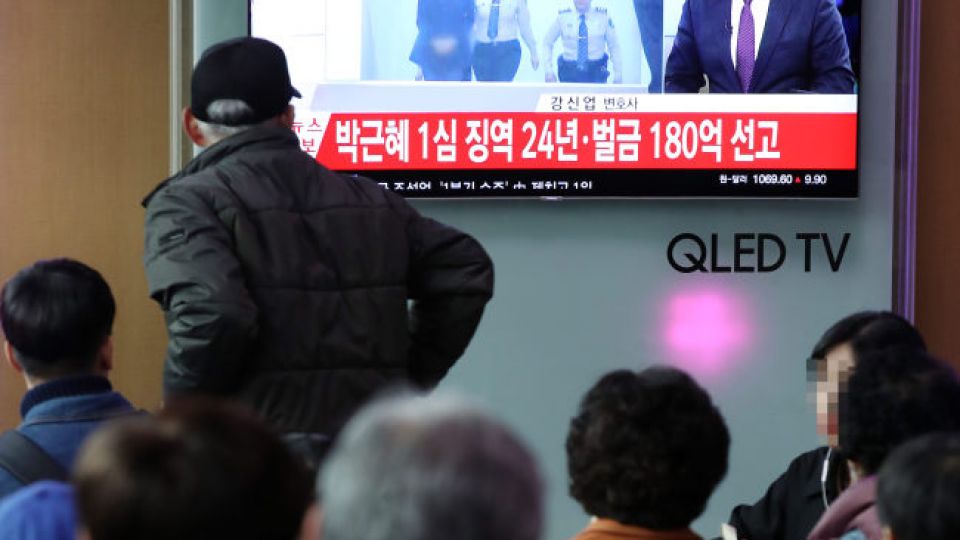April 9, 2018
The court said a heavy sentence was inevitable to prevent such an unfortunate event from happening again.
Former President Park Geun-hye was sentenced to 24 years in prison and a fine of 18 billion won ($16.8 million) on Friday, over the massive corruption scandal that led to her ouster in March last year.
The Seoul Central District Court convicted Park on 16 of 18 charges, which included abuse of power, coercion, bribery and the leaking of government secrets. Prosecutors had demanded 30 years in prison and a fine of 118.5 billion won.
The ruling, which was first of its kind made by the lowest court to be televised live, comes after almost a year since she was indicted on April 17 last year.
“As the state chief chosen by the people, Park should have used her authority according to the Constitution. But she abused her power to maintain her private relationships,” Judge Kim Se-yun said.
“Her irregularities were unveiled, and she became the very first president to be impeached in South Korean history. And for that, Park and (her civilian friend) Choi Soon-sil, who used her ties with the president to meddle in state affairs for her own benefit, are responsible.”
Describing how Park has denied all charges and shifted responsibility to others, the court said a heavy sentence was inevitable to prevent such an unfortunate event from happening again.
The court’s judgment was made by default, as Park submitted a non-attendance statement citing health reasons earlier in the morning.
Park, who was the first woman to reach the highest office in South Korea, became the third president to receive a court’s verdict over wrongdoings.
The court found Park guilty of abusing her presidential power and colluding with her longtime confidante Choi to force conglomerates to provide financial support and illicit business contracts to the Mir and K-Sports foundations allegedly run by Choi, and affiliated organizations.
It viewed that Park conspired with Choi in coercing Samsung, Lotte and SK groups to provide or promise a total of 23 billion won in bribes.
Choi was sentenced to 20 years in prison, a fine of 18 billion won and a forfeiture of 7.29 billion won in February.
The court also confirmed that Park had abused her power to order her subordinates to pressure CJ Group to dismiss its Vice President Lee Mie-kyung in 2013. Earlier in the day, her former Chief Economic Secretary Cho Won-dong was sentenced to a one-year prison term suspended for two years for his botched attempts to remove Lee, upon Park’s order.
Park’s conviction also included creating a blacklist of liberal cultural figures deemed to be critical of her conservative government, and implementing measures to discriminate against them. Her former presidential aide Kim Ki-choon was sentenced to four years in prison for colluding with her in the wrongdoing.
At Friday’s sentencing hearing, Park’s absence was expected as she has been boycotting her hearings since October last year, when the court extended her detention for another six months.
At the time, Park had called the court’s decision “political revenge.” Her seven-member legal team also resigned en masse in October, saying they had lost confidence that the court would rule in an impartial and reasonable manner. Five public attorneys have been appointed for her by the court.
Outside of the court, conservative civic group members gathered to protest against the court’s ruling and demand the release of the former leader. Police dispatched some 2,500 officers to the area. The court also closed its main gate from 1 p.m. to limit the entry of passersby due to security reasons.
Former President Park was impeached by the National Assembly on Dec. 9, 2016. She was removed from office after the Constitutional Court upheld the parliament’s decision on March 10 the next year. She has been standing trial behind bars since she was arrested on March 31 last year.
In 1996, two former Presidents Chun Doo-hwan and Roh Tae-woo were sentenced to a death sentence and 22-year prison term, respectively. The two were released on special pardons in 1997 by then-President Kim Young-sam.
– The Korea Herald


